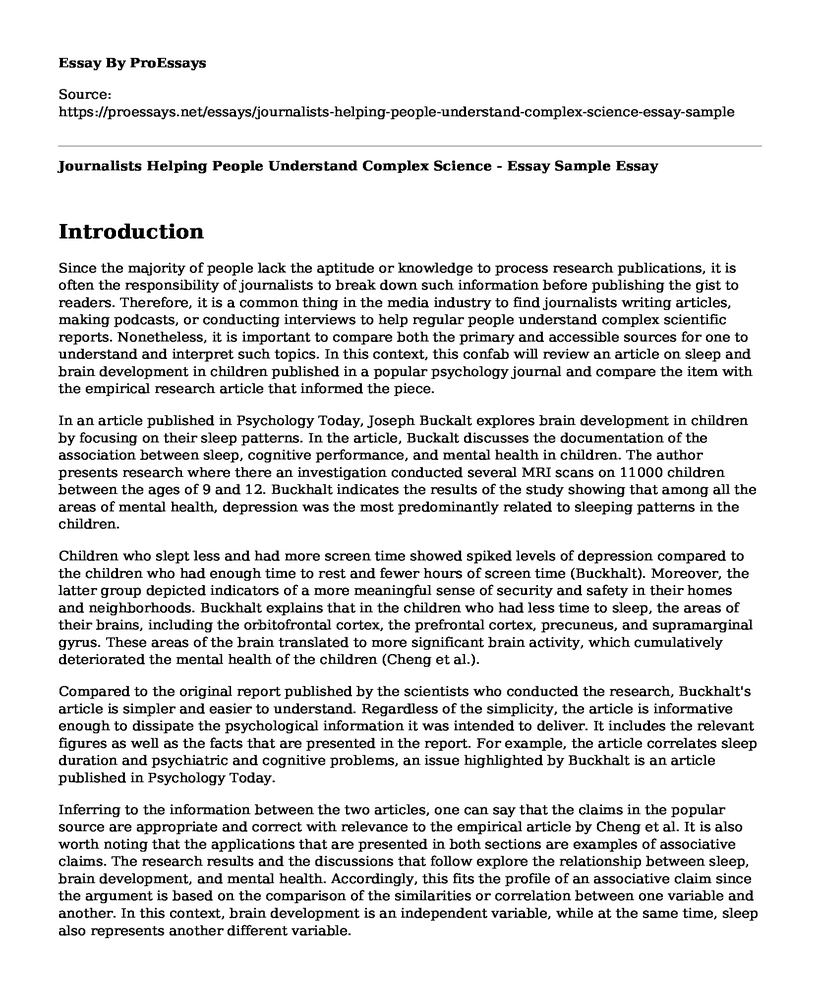Introduction
Since the majority of people lack the aptitude or knowledge to process research publications, it is often the responsibility of journalists to break down such information before publishing the gist to readers. Therefore, it is a common thing in the media industry to find journalists writing articles, making podcasts, or conducting interviews to help regular people understand complex scientific reports. Nonetheless, it is important to compare both the primary and accessible sources for one to understand and interpret such topics. In this context, this confab will review an article on sleep and brain development in children published in a popular psychology journal and compare the item with the empirical research article that informed the piece.
In an article published in Psychology Today, Joseph Buckalt explores brain development in children by focusing on their sleep patterns. In the article, Buckalt discusses the documentation of the association between sleep, cognitive performance, and mental health in children. The author presents research where there an investigation conducted several MRI scans on 11000 children between the ages of 9 and 12. Buckhalt indicates the results of the study showing that among all the areas of mental health, depression was the most predominantly related to sleeping patterns in the children.
Children who slept less and had more screen time showed spiked levels of depression compared to the children who had enough time to rest and fewer hours of screen time (Buckhalt). Moreover, the latter group depicted indicators of a more meaningful sense of security and safety in their homes and neighborhoods. Buckhalt explains that in the children who had less time to sleep, the areas of their brains, including the orbitofrontal cortex, the prefrontal cortex, precuneus, and supramarginal gyrus. These areas of the brain translated to more significant brain activity, which cumulatively deteriorated the mental health of the children (Cheng et al.).
Compared to the original report published by the scientists who conducted the research, Buckhalt's article is simpler and easier to understand. Regardless of the simplicity, the article is informative enough to dissipate the psychological information it was intended to deliver. It includes the relevant figures as well as the facts that are presented in the report. For example, the article correlates sleep duration and psychiatric and cognitive problems, an issue highlighted by Buckhalt is an article published in Psychology Today.
Inferring to the information between the two articles, one can say that the claims in the popular source are appropriate and correct with relevance to the empirical article by Cheng et al. It is also worth noting that the applications that are presented in both sections are examples of associative claims. The research results and the discussions that follow explore the relationship between sleep, brain development, and mental health. Accordingly, this fits the profile of an associative claim since the argument is based on the comparison of the similarities or correlation between one variable and another. In this context, brain development is an independent variable, while at the same time, sleep also represents another different variable.
Conferring to psychology, an internal validity in an empirical study involves the conclusion that an independent variable causes observable changes in a dependent variable. Both Buckalt and Cheng et al., in their research, support this validity since the independent variable, which is sleep, has an impact on the dependent variables of brain development and mental health. Conclusively, accessible media must represent empirical data to misinform the public accurately.
Works Cited
Buckhalt, Joseph. "Sleep, Brain Development, and Mental Health in Children." Psychology Today, 12 Feb. 2020, www.psychologytoday.com/us/blog/child-sleep-zzzs/202002/sleep-brain-development-and-mental-health-in-children.
Cheng, Wei, et al. "Sleep duration, brain structure, and psychiatric and cognitive problems in children." Molecular Psychiatry (2020): 1-12.
Cite this page
Journalists Helping People Understand Complex Science - Essay Sample. (2023, Apr 05). Retrieved from https://proessays.net/essays/journalists-helping-people-understand-complex-science-essay-sample
If you are the original author of this essay and no longer wish to have it published on the ProEssays website, please click below to request its removal:
- Igneous Rocks
- Journalism Profession Reflection Essay
- Essay Sample on Mentioning Disability in a News Report
- Atchafalaya River Essay Example
- The Geography of Galapagos Islands and Kiribati - Research Paper
- Essay Example on Exploring the Appalachian Mountains: An Ancient Landscape
- Paper Example on How to Create a Math Course for Millennial







